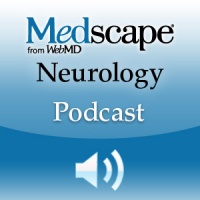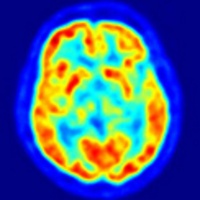Sinopsis
The Neurology podcast is introduced by Editor-in-Chief Robert A. Gross, MD, PhD, who discusses several highlighted articles in the current issue of Neurology®. The podcast regularly features content from Neurology® Clinical Practice, Neurology® Genetics, and Neurology® Neuroimmunology & Neuroinflammation. Opening segments include interviews with authors who summarize a current article and discuss the main findings and clinical implications for neurologists. Regular features also include the Lesson of the Week, Delayed Recall, Whats Trending, and selected content from Neurology® Today. Podcast listeners can earn 0.5 AMA PRA Category 1 CME Credits by answering the multiple-choice questions related to Neurology content in the online Podcast Quiz. (Delayed Recall, Neurology® Clinical Practice, Neurology® Genetics, and Neurology® Neuroimmunology & Neuroinflammation contents are excluded from the CME program). The exams are posted weekly on Tuesday.
Episodios
-
SPECIAL REPORT: On being a neurologist in Italy during the COVID-19 pandemic
17/04/2020 Duración: 17minDr. Jeff Ratliff talks with Dr. Anna Bersano about being a neurologist in Italy during the COVID-19 pandemic. Read Dr. Bersano's special editorial in Neurology: https://n.neurology.org/content/early/2020/04/01/WNL.0000000000009508. For a clearing house of neurology related information on the coronavirus go to AAN.com/COVID19 to stay up-to-date.
-
Neurology Recall: How the Brain makes -- and forgets -- memories, with Dean Buonomano and Ted Burns
17/04/2020 Duración: 45minIn this replay of a past Delayed Recall, Dr. Ted Burns talks with Dr. Dean Buonomano, author of Brain Bugs, on how the brain makes and forgets memories.
-
Neurology on the Hill; Multiple hit theory of ALS
13/04/2020 Duración: 26minIn the first segment, Dr. Jason Crowell speaks with Dr. Andrew Southerland about Neurology on the Hill. In the second part of the podcast, Dr. Matthew Harms talks with Dr. Steve Vucic about his paper on multiple hit theory of ALS. Disclosures can be found at Neurology.org. CME Opportunity: Listen to this week’s Neurology Podcast and earn 0.5 AMA PRA Category 1 CME Credits™ by answering the multiple-choice questions in the online Podcast quiz.
-
SPECIAL REPORT: Joseph Kvedar (Pres.-elect of American Telemed) & Teshamae Monteith discuss value-based care in telemedicine, telestroke, & e-consults--the future is NOW
10/04/2020 Duración: 18minDr. Teshamae Monteith talks with Dr. Joseph Kvedar about value-based care, e-consults, and telemedicine. For a clearing house of neurology related information on the coronavirus go to AAN.com/COVID19 to stay up-to-date.
-
SPECIAL REPORT: Tips to become a teleneurology expert w/ Drs. Melissa Ko & Teshamae Monteith
08/04/2020 Duración: 13minDr. Teshamae Monteith talks with Dr. Melissa Ko about telemedicine for neurologists caring for patients in light of COVID-19. For a clearing house of neurology related information on the coronavirus go to AAN.com/COVID19 to stay up-to-date.
-
Neural networks and DBS; Reconsidering biomarkers in Parkinson’s
06/04/2020 Duración: 29minIn the first segment, Dr. Jeff Ratliff talks with Dr. Nico Dosenbach about his Neuron paper on neural networks and deep brain stimulation, and they specifically cover the Neurology Today article on this paper with respect to the impact on DBS. In the second part of the podcast, Dr. Jeff Ratliff speaks with Dr. Alberto Espay about his paper—from the March 17th issue of Neurology—on reconsidering biomarkers in Parkinson disease. You can read the Neurology Today story here: https://bit.ly/2TzJr0Y; and you can read the Neuron paper here: https://bit.ly/2TX1zku. Disclosures can be found at Neurology.org. CME Opportunity: Listen to this week’s Neurology Podcast and earn 0.5 AMA PRA Category 1 CME Credits™ by answering the multiple-choice questions in the online Podcast quiz.
-
Special Report: Dr. Ian Lipkin of Columbia University (and advisor on the movie, Contagion) discusses COVID-19, including his own diagnosis & our role as neurologists
04/04/2020 Duración: 17minDr. Ian Lipkin discusses his own diagnosis with COVID-19 and what neurologists can do in light of the pandemic to keep safe and to serve patients. For a clearing house of neurology related information on the coronavirus go to AAN.com/COVID19 to stay up-to-date. Find the cast of Contagion's PSAs on the pandemic: https://abcnews.go.com/Entertainment/cast-contagion-issues-psa-coronavirus-pandemic/story?id=69853838. Find Columbia University's Control the Contagion page: https://www.publichealth.columbia.edu/controlthecontagion.
-
Generic glatiramer acetate reduces MS costs; Med adherence and out of pocket costs?
30/03/2020 Duración: 23minIn the first segment, Dr. Jason Crowell talks with Dr. Daniel Hartung about his paper on the effect of generic glatiramer acetate on the reduction of MS costs. In the second part of the podcast, Dr. Jason Crowell speaks with Dr. Brian Callaghan about his paper—also from the March 31st issue of Neurology—on the association between out-of-pocket costs and adherence to common neurologic medications. Disclosures can be found at Neurology.org. CME Opportunity: Listen to this week’s Neurology Podcast and earn 0.5 AMA PRA Category 1 CME Credits™ by answering the multiple-choice questions in the online Podcast quiz.
-
SPECIAL REPORT: Dr. Avi Nath of NINDS/NIH discusses what we need to know as neurologists about the SARS-CoV2 pandemic
27/03/2020 Duración: 31minDr. Avindra Nath provides a special report on what clinicians need to know about neurologic symptoms and complications of COVID-19. For a clearing house of neurology related information on the coronavirus go to AAN.com/COVID19 to stay up-to-date.
-
Lewy Body Dementia management; Pathologic tearfulness after limbic encephalitis
23/03/2020 Duración: 25minIn the first segment, Dr. Matthew Barrett talks with Dr. John-Paul Taylor about his paper on Lewy body dementia management, from The Lancet. In the second part of the podcast, Dr. Stacey Clardy speaks with Dr. Chris Butler about his paper on pathologic tearfulness after limbic encephalitis. You can read Dr. Taylor’s paper in The Lancet here: https://www.thelancet.com/journals/laneur/article/PIIS1474-4422(19)30153-X/fulltext. Disclosures can be found at Neurology.org. CME Opportunity: Listen to this week’s Neurology Podcast and earn 0.5 AMA PRA Category 1 CME Credits™ by answering the multiple-choice questions in the online Podcast quiz.
-
"Future of Care" interview with John Noseworthy
16/03/2020 Duración: 31minDr. Jason Crowell speaks with Dr. John Noseworthy on his NEJM article on preserving the physician-patient relationship, which you can read here: https://www.nejm.org/doi/full/10.1056/NEJMsr1912662.
-
AEDs and cognition
09/03/2020 Duración: 18minDr. Halley Alexander talks with Dr. Emma Foster about her Neurology paper discussing that antiepileptic drugs are not independently associated with cognitive dysfunction. Disclosures can be found at Neurology.org. CME Opportunity: Listen to this week’s Neurology Podcast and earn 0.5 AMA PRA Category 1 CME Credits™ by answering the multiple-choice questions in the online Podcast quiz.
-
Modeling the Price of Good Health
02/03/2020 Duración: 20minDr. Jason Crowell speaks with Denise Roland of the Wall Street Journal about her story on an obscure model driving down drug costs. You can read their paper in the Wall Street Journal here: https://www.wsj.com/articles/obscure-model-puts-a-price-on-good-healthand-drives-down-drug-costs-11572885123.
-
Encephalopathies (Delayed Recall--March 2020)
01/03/2020 Duración: 01h12minThis month’s Delayed Recall highlights 6 interviews on encephalopathies from the March and April 2013 Delayed Recall episodes. You’ll hear about encephalopathies caused by endocrine disorders, by electrolyte disorders, by liver and kidney failure, and by other organ failure. The other interviews cover encephalopathies caused by systemic disease, such as encephalopathies caused by drugs or miscellaneous causes, including vitamin deficiencies and autoimmune disorders.
-
Managing Status Epilepticus
24/02/2020 Duración: 35minDr. Stacey Clardy talks with Dr. Robert Silbergleit and Dr. Jaideep Kapur about anticonvulsant medications for status epilepticus. You can read Dr. Silbergleit and Dr. Kapur's paper in the New England Journal of Medicine here: https://www.nejm.org/doi/full/10.1056/NEJMoa1905795.
-
Infectious Encephalitis
17/02/2020 Duración: 27minDr. Stacey Clardy talks with Dr. Ken Tyler about infectious encephalitis and arthropod-borne infections in 2019.
-
Visual Snow; MS Drug Kickback Allegations
10/02/2020 Duración: 26minIn the first interview, Dr. Teshamae Monteith talks with Dr. Francesca Puledda about her paper on clinical and phenotypical descriptions of visual snow syndrome patients. In the second interview, Dr. Jason Crowell talks with Ed Silverman about the settlement over allegations a patient charity helped drug makers pay kickbacks to Medicare patients over MS drugs. You can read the STAT article here: https://www.statnews.com/2019/11/20/patient-charity-allegations-ms-drug-makers-kickbacks/.
-
Customized Gene Therapy; Quality Dementia Care
03/02/2020 Duración: 29minIn the first segment, Dr. Jason Crowell talks with Dr. Timothy Yu about patient-customized oligonucleotide therapy for a rare genetic disease. In the second part of the podcast, Dr. Jeffrey Burns talks with Dr. Amy Sanders about her implementation update on quality improvement in dementia care. You can read Dr. Yu’s paper in the NEJM: https://www.nejm.org/doi/full/10.1056/NEJMoa1813279. Disclosures can be found at Neurology.org. CME Opportunity: Listen to this week’s Neurology Podcast and earn 0.5 AMA PRA Category 1 CME Credits™ by answering the multiple-choice questions in the online Podcast quiz.
-
CTE and head trauma (Delayed Recall 2020)
01/02/2020 Duración: 50minThis month’s Delayed Recall highlights episodes on CTE and head trauma. Dr. Jason Crowell talks with Dr. Jesse Mez on his work on chronic traumatic encephalopathy and American football players, from the August 29, 2017. The next segment, from January 21, 2020, features Dr. Jeff Ratliff interviewing Dr. Charles Bernick on MRI biomarkers in boxers and MMA fighters. Next, from April 3, 2018, Dr. Lee Goldstein discusses teen concussion and early tauopathy with Dr. Jeff Ratliff. Finally, we feature the November 6, 2012 interview between Dr. Jeff Kutcher and Dr. Everett Lehman about his paper on NFL players and neurologic causes of death.
-
Multiple Sclerosis Drug Pricing
27/01/2020 Duración: 23minDr. Jason Crowell talks with Dr. Daniel Hartung about his qualitative study on drug prices for MS.














